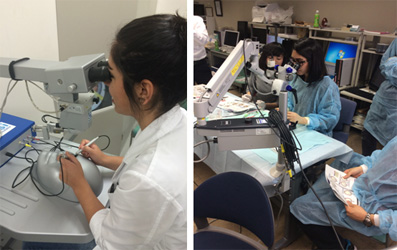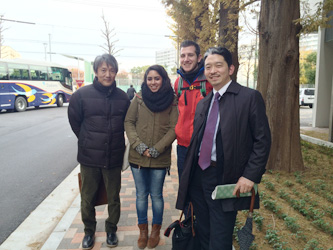Clinical Exchange in Japan
Welcome to Japan and Nagoya University school of Medicine!
Clinical Clerkship in Nagoya University
Tandis Parvizi Babadi from Austria
period: 2014/9/29-12/19
Neurology
I’ve spent the first 4 weeks in the neurological department of the Nagoya University Hospital. It was a very interesting internship and I think I’ve learned a lot.
In the morning, we usually had lectures about specific topics. Mostly the doctors presented the topic of their research, which was really interesting but sometimes a little bit too complicated. In the afternoon we normally went to the ward to see some patients. In comparison to Japan, in Austria medical students are allowed to do almost all the medical examination by themselves. Therefore we couldn’t improve our practical skills that much, but on the other side, we’ve gained a lot of theoretical knowledge. It was really fascinating to learn more about diseases, that are common in Japan but not in Europe, such as Neuromyelitis Optica (NMO) or Chronical Inflammatory Demyelinating Polyneuropathy (CIDP). We even had the chance to examine a patient with NMO. At this point, special thanks to Dr. Araki, who took the time to explain us the medical history and the progress of the disease.
The big round took place every Tuesday, led by the head of neurology. That was always very instructive, since all the patients were presented, including their medical history and treatment. We also discussed rare cases, like a young woman with recurring meningitis or a man with a rare type of myasthenia gravis (Antibodies against LRP-4).
The doctors also tried to explain us electrophysiological examinations, such as EEG, ENG and EMG. Since we haven’t had learned so much about these things, it was really informative for us. After the examinations of the patients, we had the opportunity to try the ENG on each other. Thereby we learned the differentation between several Myopathies and Neuropathies.
We spent one day in the Red Cross Hospital at the Stroke Unit. There, the doctors took their time to show us their patients and explain us medical imaging, like MRI or MIBG.
In the afternoon, we joined the big round with the head of the neurology department. We saw a patient with ossification of the posterior longitudinal ligament (OPLL), another kind of disease, which is rather rare in Europe. One of the residents performed the examination and the doctor tried to translate each step for us. I was allowed to do the Jack-Knife-maneuver to feel the spasticity of the lower extremity. Another patient had metastasizing small cell lung cancer, which caused ataxia and dizziness.
All in All, all doctors exerted themselves to give us an understanding of neurology, special diseases and their diagnosis and treatment. Sometimes it was hard to communicate, because not every patient or doctor could speak English and we don’t speak Japanese, but altogether we usually managed to follow the conversation.
Gynecology and Obstetrics
After my rotation in Neurology, I’ve spent 4 weeks in the department of Gynecology and Obstetrics. To see all aspects of that field, I’ve split these 4 weeks in 2 weeks Obstetrics, 1 week Reproductive Medicine and 1 week Gynecology.
During my internship in Obstestrics I had the opportunity to assist during several Cesarean sections in order to improve my surgical skills. The doctors took their time to explain me each step of the procedure and gave me the chance to try to knot and sew.
Besides assisting during operations, they taught me how to perform ultrasound on pregnant women and how to interpret Cardiotocographies and MRI’s. In the outpatient clinic I could to do the bimanual vaginal examination, which I have never done before. My personal highlight during these two weeks was definitely to see a normal transvaginal birth. Not only that this was a fascinating moment that I was allowed to be part of but also that I could apply everything I have learned so far.
As Congenital Diaphragmatic Hernia is one of the major topics in that clinic, they are seeing and treating a lot of patients with that kind of disease and they are even doing research on pregnant rats, where they are examining the effect of different substances on the development of the Diaphragm. After discussing this very special disease, I got the unique chance to observe the operation, where they close up the Hernia in the Diaphragm and replace the organs into the abdomen.
While working in the department of Reproductive Medicine, the doctors gave me an understanding of Embryo transfer, In-Vitro-Fertilisation and transgavinal Insemination. Since this is a subject I haven’t had in Medschool yet, it was very interesting for me to learn more about it.
During my time in Gynecology, I have gained a lot of knowledge about all kind of gynecological malignancies, endometriosis and cysts. Most of the time, I was either in the Operation Room or in the Outpatient clinic.
The most interesting operation I was allowed to assist in, was the removal of an ovarial tumor and the dissection of the pelvic and paraaortal lymphatic nodes, since I’m writing my thesis about a similar topic.
Ophtalmology
In December, I had the pleasure of spending two weeks of my internship at the Department of Ophtalmology of the Nagoya University Hospital.
Since this was the first time for me to work in this field, I didn’t know what to expect. Therefore I was just positively suprised and really enjoyed my rotation at this department. All the doctors were very friendly and helpful and made me feel welcome.
During surgery they tried to explain me every step and once they even gave me the chance to assist during a cataract surgery. Thanks to my well-structured schedule, I could see all different aspects of this field and gained a lot of knowledge by visiting the outpatient clinic and the operation room. In my free time I had the opportunity to train doing sewture under the microscope. Furthermore, I was allowed to practise slit lamp examination and fundoscopy. My personal highlight was definitely the VR magic simulator. Under supervision, I had the unique chance of improving my practical skills in cataract surgery and vitrectomy. I was impressed by the precision of the machine, it felt like operating on a real patient. After seeing my interest in these surgeries, the doctors invited me to try cataract surgery on a pig’s eye, which was informative and fascinating.
All in all, I’m really grateful that I had the chance of spending two weeks of my rotation in this department. Not only that I had the opportunity to extend my theoretical knowledge about ophtalmological diseases, but also to actively practise in order to improve my surgical skills. I can just strongly recommend an internship at this department for anyone who is interested in learning more about Ophtalmology.

Otorhinolaryngology
The last two weeks of my internship at the Nagoya University Hospital I’ve spent in the Department of Otorhinolaryngology. Here I gained insight into different types of head and neck tumors, the treatment after a total laryngectomy (tracheoesophageal shunt) and vocal cord paresis. In the outpatient clinic I could observe special examinations such as swallowing test, audiometry, ultrasound and endoscopic laryngopharyngoscopie.
Furthermore the doctors tried to give me an understanding of various diseases by explaining me MRI’s and CT’s. Beside seeing patients with head and neck malignancies, I also had the chance to learn more about common ENT diseases like sinusitis, otitis media, tinnitus, etc.
In the operation room I could observe all kind of head and neck surgeries (total laryngectomy, total thyroidektomy, neck dissection), cochlea implantation on a child and tympanoplastic after removing a cholesteatoma. Since all the doctors could speak very good English, they tried to explain me every step and I managed to follow the whole procedure. During the last operation, the doctors invited me to scrub in with them. It was a total thyroidektomy including neck dissection, which took almost 7 hours. As this was the first time for me to stand for such a long time, it was a bit tough but still very interesting to see all the structures from close up.

All in all, I’m really grateful that I got the chance to come to Japan for these 3 months.
I got an insight into the Japanese health care system and learned more about special diseases that are common in this area. Furthermore, I could dive into a totally new culture and experienced how friendly and welcoming the people are. I also tried to gain some basic skills in Japanese to make my everyday life here easier.
I’m sad that the time has passed so quickly and I can just strongly recommend this programm for anyone who is interested in studying medicine abroad and wants to learn more about a different culture.
Special thanks to Dr. Kasuya and Dr. Kondo who tried their best to help us with every problem or question that came up. They really helped us a lot.
Click here to read other stories
Nagoya University Graduate School of Medicine